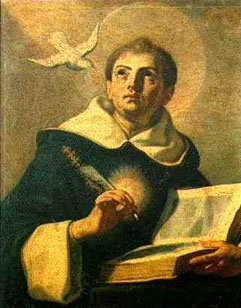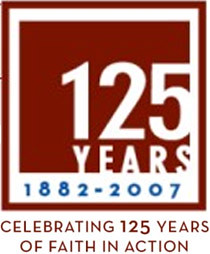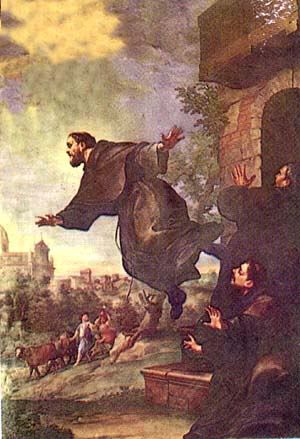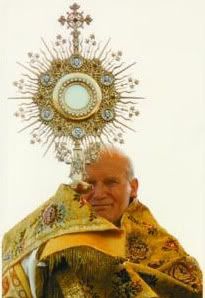St. Thomas Aquinas
 Today is the feast of the Angelic Doctor: St. Thomas Aquinas, priest, Doctor of the Church.
Today is the feast of the Angelic Doctor: St. Thomas Aquinas, priest, Doctor of the Church.Possessed of knowledge and insight that surpassed purely human capacities, the man quite literally knew everything that there was to be known at the time.
Born at Rocca Secca in Naples in either 1225 of 1227, his father was Count of Aquino and his family was related to the Holy Roman Emporer. He was sent at the age of five to Monte Casino, to study with the Benedictines. A quiet and studious child, he amazed his tutors with the question "What is God?" In 1236 he moved to the University of Naples, where he continued his life of quiet study. The date of his entry into the Dominican order is uncertain, but occurred some time betwenn 1240 and October 1243. His mother, Theodora, came to Naples to see her son with mixed feelings, but the Dominicans feared she would carry him away, sent him to Rome. On the road he was captured by his older brothers, who locked him in a tower at their mother's direction. His family kept him there for two years, endeavoring to destroy his vocation. His brothers even brought in prostitutes to tempt him, but Thomas drew a brand from the fireplace and chased them from his chamber.
He then implored God to grant him "integrity of mind and body," and as he slept afterwards, was visited in his dreams by angels who tied around him a white girdle and telling him that his prayer had been answered, said "we gird thee with the girdle of perpetual virginity." For the rest of his life, Thomas was completely free from concupiscence.
The kindness of his sisters provided him with the Scriptures and other holy books during his captivity, and Thomas spent his two years in the tower memorizing the Bible. When he was finally released to the Dominicans, they remarked that he had made more progress during his captivity than if he had been enrolled at their schools. He immediately professed his vows and was sent to Rome, where Innocent IV examined him, and satisfied with his committment, blessed him and forbade any further interferance with his vocation.
Afterwards, Thomas was sent to Cologne and placed under the tutilage of the Order's premier scholar, St. Albertus Magnus. In Cologne Thomas was viewed by his peers as somewhat of a dunce, as they misinterpreted his quiet and humble nature. Upon hearing the epithet, "the dumb ox," that had been attached to his student, St. Albert declared "You call him a dumb ox, but I tell you that one day the ox will bellow so loudly that his bellowing will fill the whole world." In Cologne, around 1250, Thomas was ordained. In addition to teaching under Albert, he preached throughout France, Germany, and Italy, and became renowned for his powerful, insightful, and scripture-referencing sermons.
In 1251 or 1252 he was moved to Paris, to teach at the Order's stadium there. This was the effective beginning of his public life, for his teaching garnered widespread attention. His lectures from this period provided a large body of material for the Summa Theologica. He was also involved in a contentious dispute between the Church, the city of Paris, and the University of Paris in which the University attempted to bar the Franciscans and Dominicans from taking their chairs. This dispute -- required the intervention of both St. Louis IX and Pope Alexander IV, and Thomas was finally elevated to the Doctorate in 1257.
During his time in Paris he became good friends with St. Boneventure, who received his doctorate on the same day as Aquinas, and also with the king, St. Louis IX. He was a favorite at Louis's court, although he stood out somewhat from the other figures there. At one particular feast, he sat thinking while the festivities went on around him, and then quite suddenly brought his fist crashing down upon the table and thundered "THAT will settle the Manichees!" This indication of his having worked some quite tricky syllogism quite surprised the surrounding courtiers, and the king, quite amused, urged that writing materials be brought in haste, lest the philosopher forget his discovery.
His teaching was in such great demand that he did quite a bit of travelling, preaching throughout France and Italy. The popes constantly entreated him to come and stay and Rome as their advisor, the heads of the Order desired his advice, everywhere people requested his assistance. Although he would have preferred to stay at home and write and pray, he was on several occassions present at the deliberations of the General Chapters of the Dominicans. Clement IV appointed him Archbishop of Naples in 1265, but relented when Thomas tearfully begged to be released from the obligation.
Thomas was frequently given to visions and ecstasies, especially towards the end of his life. In 1273, during mass, Our Lord spoke to him and said, "Thou hast written well of me, Thomas; what reward wilt thou have?" Thomas replied, "None other than Thyself, Lord." In December of that year, he laid aside his pen and refused to write any more. On the 6th, he received an unusually long ecstasy during mass, and afterwards told a colleague, "I can do no more. Such secrets have been revealed to me that all I have written now appears to be of little value." The Summa was left incomplete, only having reached the 19th question of the 3rd part.
In 1274, Gregory X convened a general council, and summoned St. Thomas and St. Boneventure to appear. Thomas was to present his work Contra errores Graecorum. He set out on foot, but his strength failed him, and he collapsed near Terrecina. He was conducted to Cistercian monastery of Fossa Nuova by way of the Castle of Maienza (which happened to be the home of a niece). Thomas was alarmed by the Cistercians' hospitality, feeling himself unworthy of such treatment. Ill though he was, he dictated a brief commentary on the Song of Songs at the urgings of the monks. Upon receiving viaticum, he declared
If in this world there be any knowledge of this sacrament stronger than that of faith, I wish now to use it in affirming that I firmly believe and know as certain that Jesus Christ, True God and True Man, Son of God and Son of the Virgin Mary, is in this Sacrament . . . I receive Thee, the price of my redemption, for Whose love I have watched, studied, and laboured. Thee have I preached; Thee have I taught. Never have I said anything against Thee: if anything was not well said, that is to be attributed to my ignorance. Neither do I wish to be obstinate in my opinions, but if I have written anything erroneous concerning this sacrament or other matters, I submit all to the judgment and correction of the Holy Roman Church, in whose obedience I now pass from this life.
He died on 7 March, 1274. His death was followed by numerous miracles, and he was canonized by John XXII on 18 July, 1323. His body was enshrined by the Dominicans at Tolouse, but was removed to the Church of St. Sernin when the shrine was destroyed during the French revolution. His left arm is kept in the cathedral of Naples, and his right arm was entrusted to the University of Paris, but it too was removed during the revolution, and now resides in Rome. St. Pius V named him a Doctor of the Church in 1567, and Leo XIII named him patron of all all Catholic universities, academies, colleges, and schools, as well as "prince and master of all Scholastic doctors."
Works of Aquinas
Summa Contra Gentiles (with some abridgements)
Summa Theologica Online (and at Amazon)
Quaestiones disputatae (only Latin)
A bibliography of where to find other stuff
Hymns by Aquinas
Pange Lingua (with music)
Sacris Solemniis
Verbum Supernum
Works About Aquinas
St. Thomas Aquinas: The Dumb Ox - G.K. Chesterton (and at Amazon)
St. Thomas Aquinas at Newadvent
File Under: Saints








0 Comments:
Post a Comment
<< Home